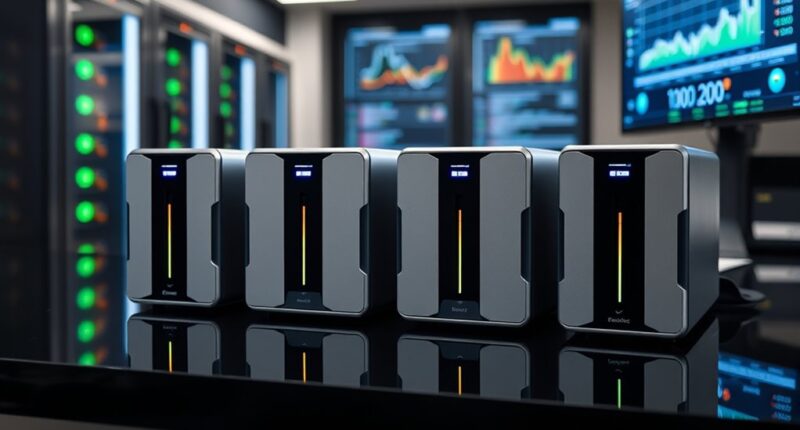If you’re looking for the 15 best NAS devices of 2025, I recommend options like the UGREEN NASync DXP2800, BUFFALO LinkStation 210, and Synology DS223j for versatile home and small business use. High-end models like the Asustor Lockerstor 6 and QNAP TR-004 offer advanced performance and expandability. Each device caters to different needs from simple backups to high-speed data management. Stick around, and you’ll discover how to choose the perfect NAS for your setup.
Key Takeaways
- Top NAS devices in 2025 feature advanced connectivity options like multi-Gigabit Ethernet and USB-C for fast data transfer.
- They offer a range of storage capacities, from single-bay personal units to multi-bay enterprise-ready solutions.
- Many models include user-friendly management interfaces, remote access, and integrated backup and security features.
- Devices support diverse protocols such as SMB, AFP, NFS, and iSCSI for seamless multi-platform data sharing.
- High-performance options with SSD caching and multi-Gigabit ports ensure quick, reliable data management for all user needs.
UGREEN NASync DXP2800 2-Bay Desktop NAS
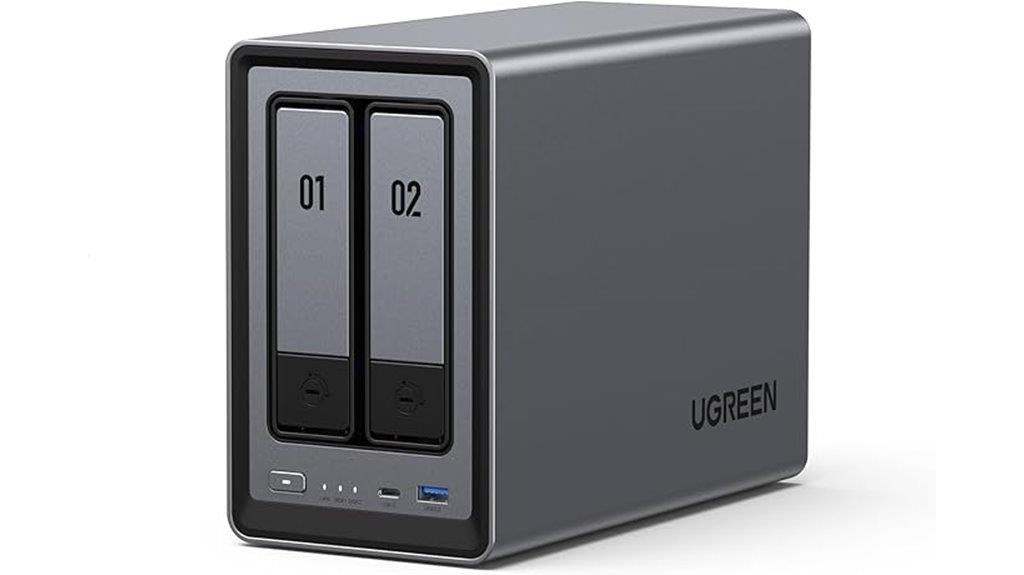
If you’re looking for a compact yet powerful NAS solution for home or small office use, the UGREEN NASync DXP2800 is an excellent choice. It features an Intel N100 quad-core processor, 8GB DDR5 RAM, and supports up to 76TB storage capacity, making it versatile for backups, media, and file sharing. The system uses eMMC storage for reliable OS performance, delivering fast read/write speeds and high IOPS. With dual 2.5GbE ports, M.2 NVMe slots, 4K HDMI output, and support for third-party drives, it offers impressive flexibility. Its energy efficiency, quiet operation, and user-friendly interface make it ideal for seamless data management at home or in small offices.
Best For: home users and small offices seeking a reliable, high-performance NAS for data backup, media streaming, and file sharing with easy setup and energy efficiency.
Pros:
- Powerful Intel N100 quad-core CPU with 8GB DDR5 RAM for smooth multitasking and fast data access
- Supports up to 76TB storage, ideal for extensive backups, media libraries, and document management
- Quiet operation with low power consumption, making it suitable for desktop environments
Cons:
- No included drives; users must purchase compatible storage separately
- Limited to two drive bays, which may restrict scalability for very large storage needs
- The system uses eMMC for OS storage, which might be less flexible for advanced customizations compared to traditional drives
BUFFALO LinkStation 210 4TB NAS Storage with HDDs
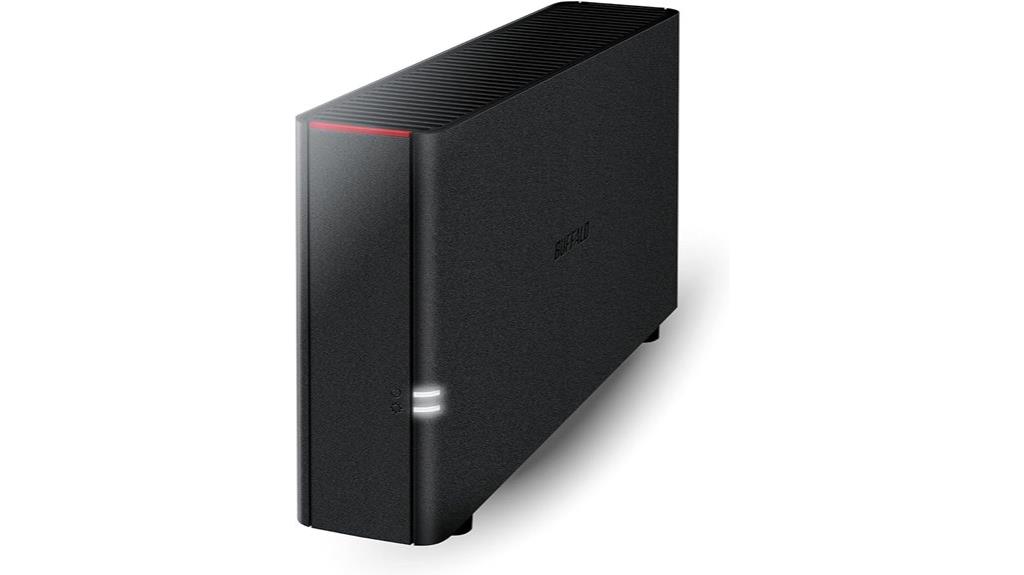
The BUFFALO LinkStation 210 4TB NAS Storage is an excellent choice for home users seeking simple, centralized data management. It offers 4TB of storage with a single HDD, supporting Windows, macOS, Android, and iOS devices. Connecting via your router, it enables easy network sharing, backups, and personal cloud features. The device includes built-in security with SSL encryption, RAID support, and automated backups through its software. Its straightforward setup and management interface make it user-friendly, while remote access and folder restrictions enhance control. Overall, it provides reliable, quiet operation for everyday data needs, making it a solid option for those prioritizing simplicity and security.
Best For: home users seeking a simple, reliable, and secure centralized storage solution for everyday data management across multiple devices.
Pros:
- Easy setup and user-friendly management interface
- Supports multiple platforms including Windows, macOS, Android, and iOS
- Built-in security features like SSL encryption and RAID support
Cons:
- Limited to a single hard drive bay, offering 4TB capacity without expansion
- Some users report issues with drive longevity and overheating
- Outdated hardware technology may affect performance and future compatibility
UGREEN NASync DH4300 Plus 4-Bay Desktop NAS
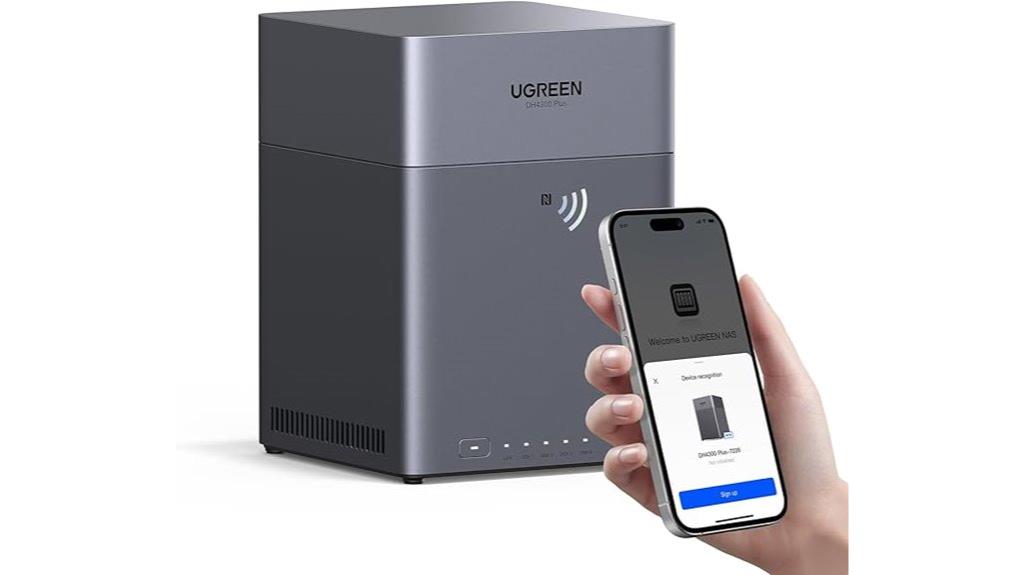
The UGREEN NASync DH4300 Plus 4-Bay Desktop NAS stands out as an excellent choice for small businesses or tech-savvy home users who need reliable, high-capacity storage with flexible data management. It supports up to four drives, reaching 120TB capacity, compatible with Western Digital, Seagate, Toshiba, and more. The NAS features a quad-core Intel N5105 processor, 8GB RAM, and fast connectivity options like 2.5GbE Ethernet and 4K HDMI output. Its intuitive UGOS software offers easy setup, remote access, and AI-powered photo management, making it a versatile, secure, and cost-effective solution for seamless data organization and backup.
Best For: small businesses and tech-savvy home users seeking reliable, high-capacity local storage with flexible data management and advanced features.
Pros:
- Easy to set up with intuitive UGOS software and plug-and-play drive installation
- Supports up to 120TB of storage across four drives with multiple RAID options
- Offers robust performance with a quad-core processor, 2.5GbE connectivity, and 4K HDMI output
Cons:
- Initial drive setup wipes existing data, requiring caution during installation
- Some users report limitations with auto backup apps and occasional software bugs
- Requires some networking knowledge for optimal remote access and security configuration
Asustor Drivestor 2 Pro Gen2 NAS (AS3302T v2)
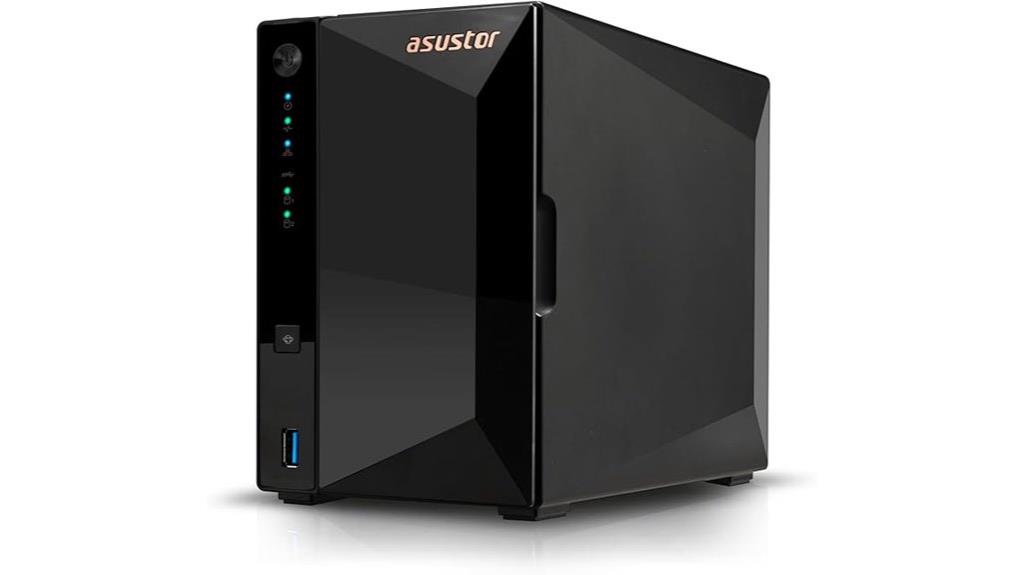
Looking for an affordable yet capable NAS device for small home media storage? The Asustor Drivestor 2 Pro Gen2 (AS3302T v2) fits the bill perfectly. It features a 2-bay design, a fast quad-core Realtek processor, and 2GB of DDR4 RAM, ensuring smooth media transcoding and data management. With 2.5GbE Ethernet, it offers quick network transfers, and its tool-free setup makes installation simple. The device supports various RAID configurations, cloud backups, and app integrations like Plex. Its compact, sleek design and quiet operation make it ideal for home use, and users praise its performance and ease of use.
Best For: small home users seeking an affordable, easy-to-use NAS with reliable media storage and transcoding capabilities.
Pros:
- Compact and sleek design ideal for home environments
- Fast quad-core processor with 2.5GbE Ethernet for quick data transfer
- User-friendly setup with support for various RAID configurations and app integrations like Plex
Cons:
- Limited 2GB RAM may restrict heavy multitasking or advanced server functions
- Occasional need for manual app updates (e.g., Plex) due to app bugs or compatibility issues
- CPU capacity might be insufficient for more demanding media server tasks like JellyFin
Synology 2-Bay DiskStation DS223j (Diskless)
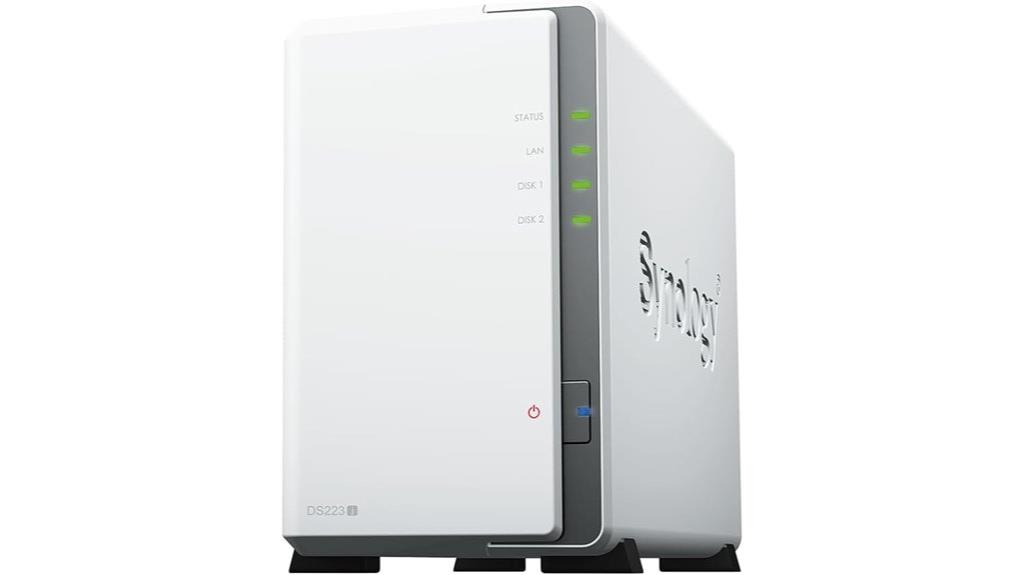
Are you seeking a reliable private cloud solution that offers complete data ownership and easy access from multiple devices? The Synology 2-Bay DiskStation DS223j (Diskless) is perfect for that. It provides a secure, private cloud environment where you can share and sync files across platforms effortlessly. You’ll have full control over your data and protection through extensive backup options. Plus, with a 2-year warranty and support resources like Synology’s knowledge center and YouTube tutorials, setup is straightforward. Designed for seamless, private data management, it’s an excellent choice for users prioritizing security, accessibility, and reliable storage.
Best For: individuals and small teams seeking a secure, private cloud storage solution with easy multi-device access and robust data protection.
Pros:
- Reliable private cloud environment with full data ownership
- Easy file sharing and synchronization across multiple platforms
- Comprehensive backup options for data protection and recovery
Cons:
- Diskless setup requires purchasing compatible drives separately
- Limited to two drive bays, which may constrain storage expansion
- Basic hardware features may not support heavy enterprise workloads
Yottamaster 1 Bay NAS Storage for HDD/SSD
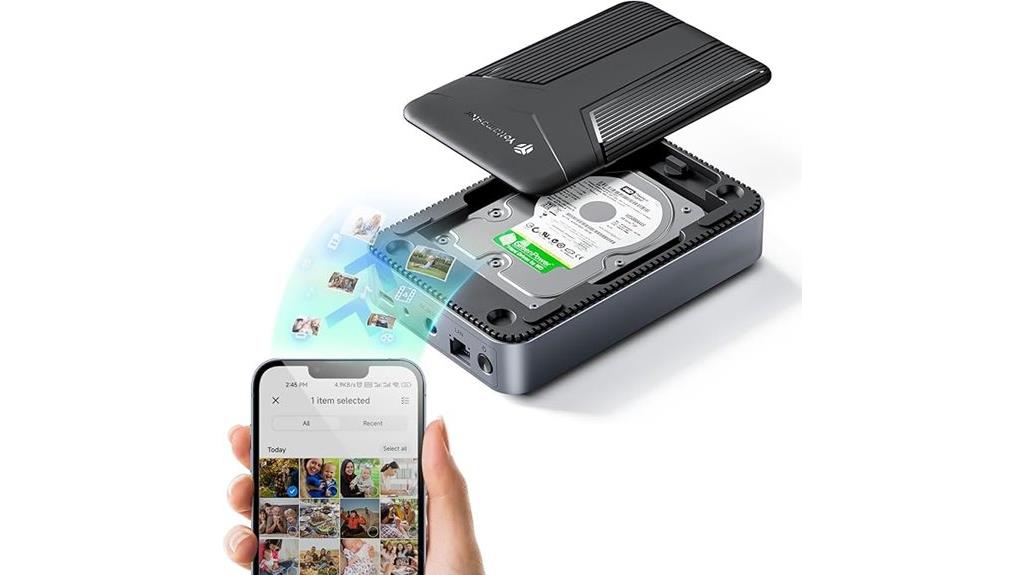
If you’re seeking a compact, easy-to-use storage solution for personal multimedia and backups, the Yottamaster 1 Bay NAS Storage stands out as an ideal choice. It supports 2.5-inch SATA HDD/SSD drives up to 8TB, with a tool-free installation and a sleek magnetic cover. Connecting via a 5Gbps USB Type-C port, it offers fast transfer speeds of up to 120MB/s. Powered by a quad-core ARM CPU, 1GB DDR4 RAM, and a 1GbE network port, it ensures reliable performance. With features like automatic multimedia categorization, remote access, and robust security options, it’s perfect for simple, secure personal data management.
Best For: individuals seeking a compact, easy-to-use personal cloud storage solution for multimedia, backups, and remote file access.
Pros:
- Simple tool-free installation with magnetic cover for easy setup
- Fast transfer speeds up to 120MB/s via USB-C connection
- Robust security features including remote access, user permissions, and offline backups
Cons:
- Limited to a single 2.5-inch SATA drive up to 8TB, not suitable for large-scale storage needs
- Lacks support for multiple drive bays or RAID configurations
- May require additional network setup for remote access and security configurations
QNAP TS-464-8G-48WD-US Desktop NAS with 24TB Storage
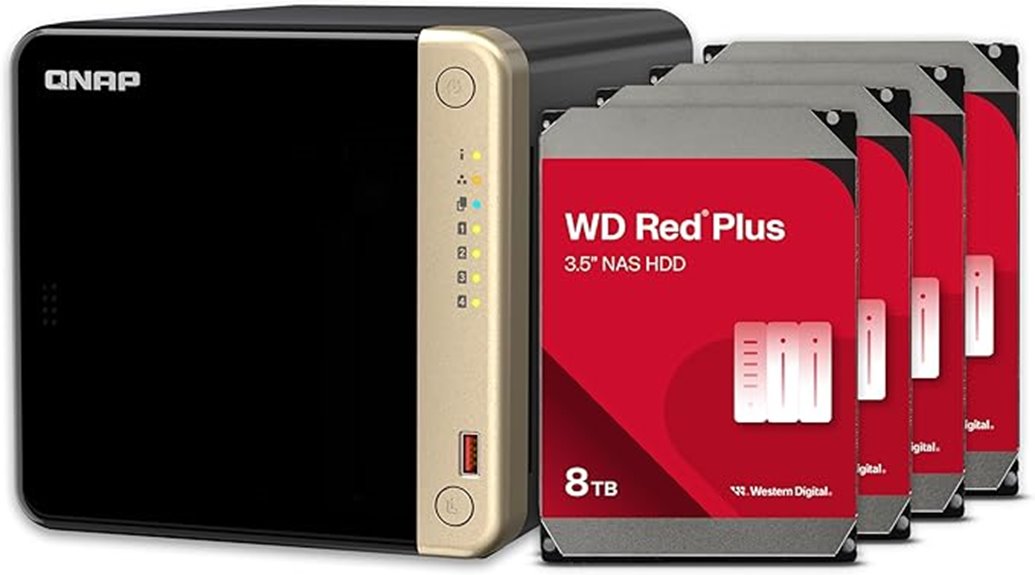
The QNAP TS-464-8G-48WD-US Desktop NAS is an excellent choice for home users and small businesses seeking reliable, high-performance storage with easy expansion. It comes with four pre-installed 8TB WD Red Plus drives, configured in RAID 5, providing 24TB of secure storage. Its dual M.2 NVMe slots boost performance with cache acceleration or additional SSD storage. Powered by a quad-core Intel Celeron processor and 8GB DDR4 RAM, it handles multitasking effortlessly. Dual 2.5GbE ports ensure fast network transfers, while multiple USB 3.2 ports facilitate quick backups and media transfers. Secure remote access and versatile backup options make it an all-around reliable storage solution.
Best For: home users and small businesses seeking reliable, high-performance storage with easy expansion and secure remote access.
Pros:
- High-capacity 24TB storage with RAID 5 for data security
- Fast network connectivity with dual 2.5GbE ports and USB 3.2 ports
- Powerful quad-core Intel Celeron processor and 8GB DDR4 RAM for multitasking
Cons:
- Limited to 8GB RAM, which may restrict heavy multi-user workloads
- No built-in HDMI or multimedia output options
- Can be more expensive compared to basic NAS models without SSD caching or higher RAM capacity
BUFFALO TeraStation Essentials 4-Bay Desktop NAS with Hard Drives
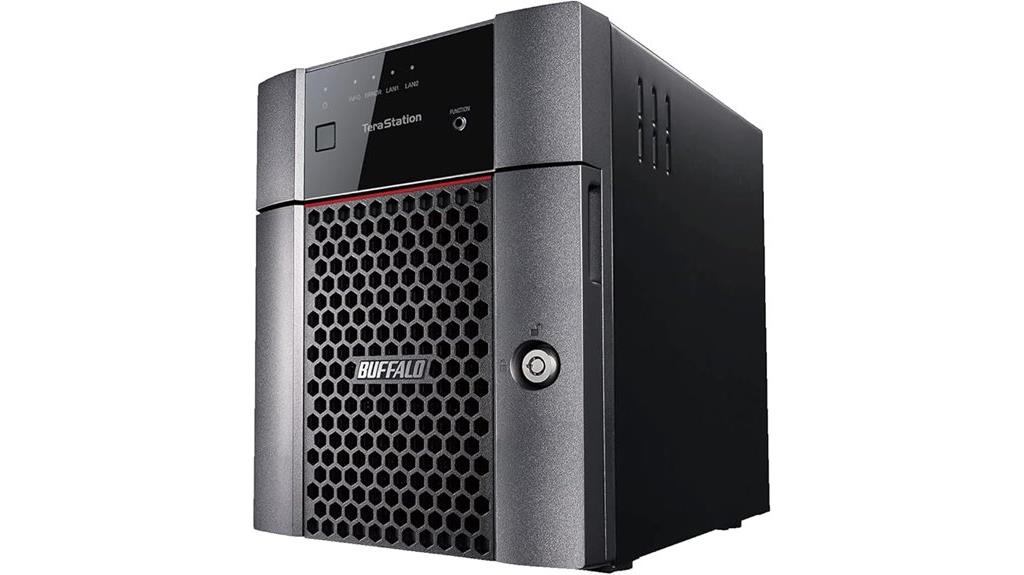
For small businesses and tech-savvy home users seeking a reliable, cost-effective storage solution, the BUFFALO TeraStation Essentials 4-Bay Desktop NAS stands out with its pre-configured RAID 5 setup and high-speed 2.5GbE port. It offers 16TB of total capacity with four pre-installed 4TB drives, providing 12TB of usable storage. Designed for easy setup and management, it features built-in data protection with 256-bit encryption, flexible backup options, and cloud integration with Amazon S3, Dropbox, Azure, and OneDrive. Supported by a 3-year warranty, US-based support, and made in Japan, it delivers reliable, scalable network storage for small-scale needs.
Best For: small businesses and tech-savvy home users seeking a reliable, scalable, and cost-effective network storage solution with easy setup and management.
Pros:
- Pre-configured RAID 5 setup with high-speed 2.5GbE port for fast data transfers
- Includes four pre-installed 4TB drives, providing 12TB of usable storage out of the box
- Supports cloud integration with major providers like Amazon S3, Dropbox, Azure, and OneDrive
Cons:
- Some users report occasional connectivity issues, disconnections, or network drops
- Limited to RAID 5 by default, which may require reconfiguration for different redundancy needs
- Slightly larger footprint and weight, which might be less suitable for compact or space-constrained setups
TERRAMASTER F8 SSD NAS Storage
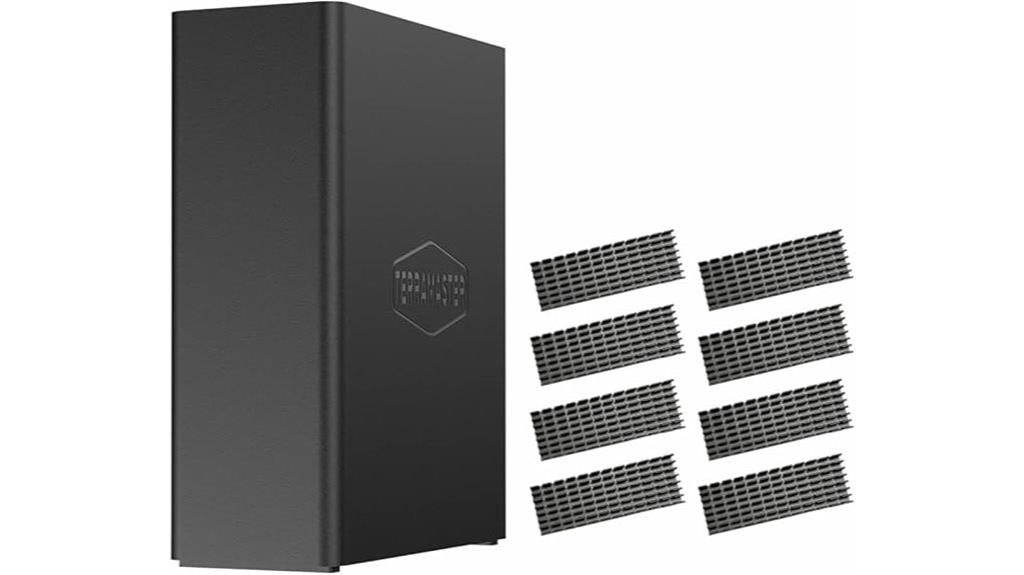
The TERRAMASTER F8 SSD NAS Storage stands out as an ideal solution for small businesses and home users who require high-speed, reliable data access without sacrificing convenience. Its all-SSD design, powered by an N95 quad-core processor and 8GB DDR5 RAM, delivers transfer speeds up to 1024MB/s via a 10GbE port. Supporting eight NVMe SSDs up to 8TB each, it offers a total capacity of 64TB. The device’s compact, lightweight form factor, combined with tool-free upgrades and advanced cooling, ensures easy setup and stable operation. Plus, its extensive backup suite provides robust data security, making it perfect for seamless, high-performance storage.
Best For: small businesses and home users seeking high-speed, reliable, and easy-to-maintain SSD-based NAS storage solutions.
Pros:
- High transfer speeds up to 1024MB/s with a 10GbE port for fast data access.
- Compact, lightweight design with tool-free SSD and RAM upgrades for easy setup.
- Advanced cooling system ensures stable performance and low noise levels below 19dB.
Cons:
- Limited to SSDs only, which can be more expensive than traditional HDD options.
- Total capacity capped at 64TB, which may be insufficient for very large data needs.
- Requires familiarity with network setup for optimal use, which could be challenging for beginners.
Yxk Zero1 2-Bay Desktop NAS with Quad-Core CPU
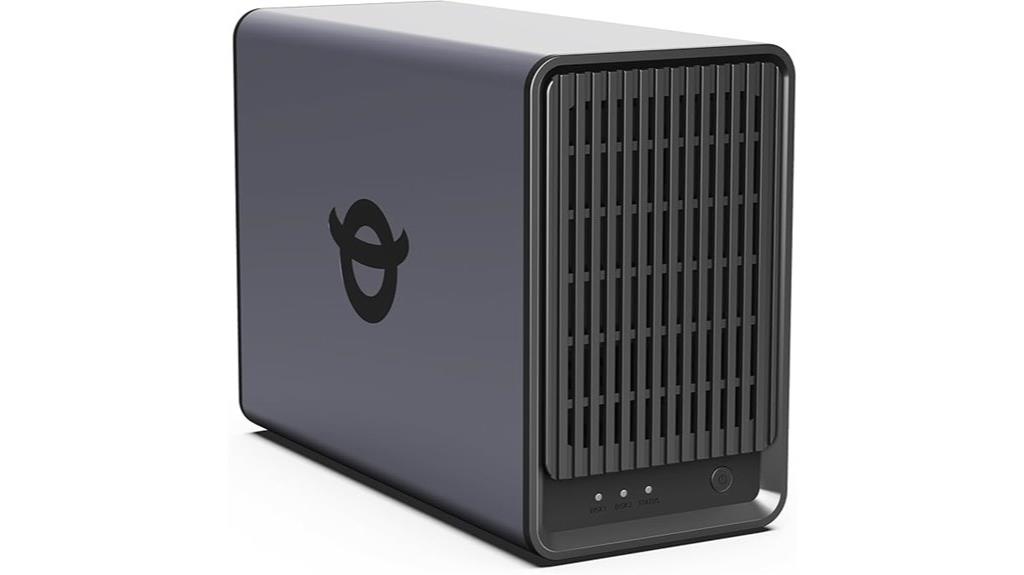
If you’re looking for a reliable, compact NAS that combines powerful performance with simple setup, the Yxk Zero1 2-Bay Desktop NAS with Quad-Core CPU is an excellent choice. Weighing just 3.83 pounds, it fits easily into any home or office space. It features a quad-core CPU, 2.5GbE port, HDMI output, and advanced cooling for quiet operation. Setup is quick—just scan a QR code to configure. It offers enterprise-grade data security with RAID, encryption, and snapshot recovery. Seamless capacity expansion, multi-user collaboration, and AI-powered multimedia management make it versatile. Customers praise its ease of use, high-quality hardware, and one-time investment benefits, making it a standout device in 2025.
Best For: home users and small office teams seeking a reliable, easy-to-setup NAS with enterprise-grade security and multimedia management.
Pros:
- Compact and lightweight design ideal for various environments
- Quick QR code setup for hassle-free installation
- Supports seamless capacity expansion and multi-user collaboration
Cons:
- Registration process limited to phone number only, which may affect some users
- Fewer app options compared to competitors like QNAS or Synology
- Premium packaging and hardware may come at a higher initial cost
BUFFALO LinkStation SoHo 220 12TB NAS with Hard Drives
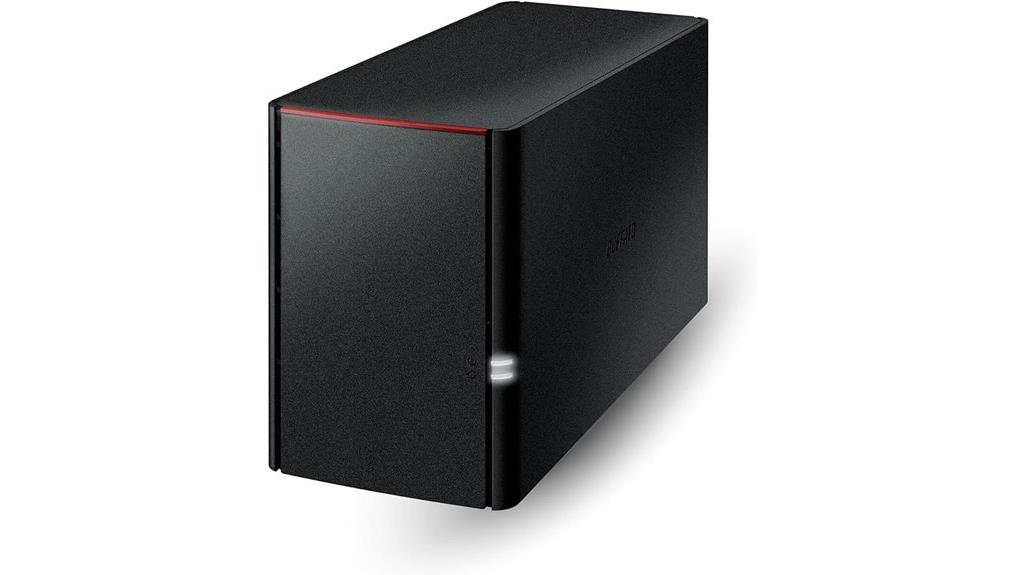
Looking for an affordable, straightforward NAS solution that offers ample storage and easy setup? The BUFFALO LinkStation SoHo 220 12TB NAS fits the bill perfectly. It comes with two pre-installed 6TB drives, configurable via RAID 0 or RAID 1, giving you flexible data redundancy or maximum capacity. Compact and simple to connect to your router, it supports both Windows and macOS, making sharing and backups easy. While it’s designed for small offices or home use, some users mention interface limitations and initial setup challenges. Overall, it’s a reliable, budget-friendly option for those needing secure, accessible storage without complicated features.
Best For: small home offices or individual users seeking an affordable, easy-to-set-up NAS for basic file sharing and backups.
Pros:
- Affordable price point with included hard drives
- Easy to set up and connect to routers for network sharing
- Compatible with Windows and macOS for versatile backups
Cons:
- Limited interface and remote management features
- Some users experience slow performance and setup delays
- Basic software with fewer advanced options and support
SSK 4TB Personal Cloud NAS Storage with Ethernet
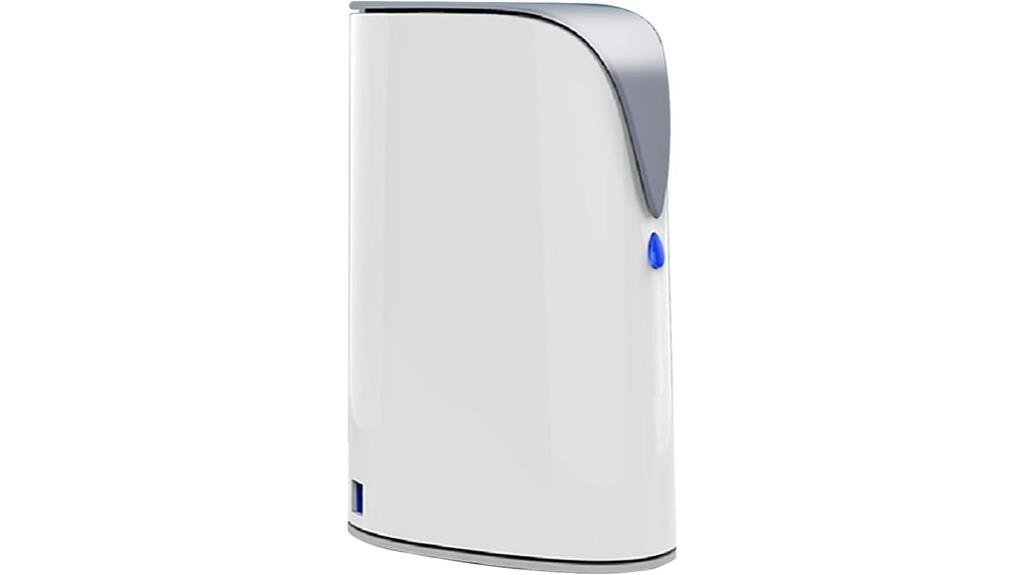
For home users seeking centralized data management without relying on WiFi, the SSK 4TB Personal Cloud NAS Storage with Ethernet offers a straightforward solution. It features a built-in 4TB hard drive and connects directly to your router via Ethernet, supporting remote access on PC and mobile devices. Compatible with iOS, Android, Windows, and Mac, it uses proprietary software and supports Samba and DLNA protocols for easy LAN sharing. While setup can be tricky and performance issues like slow remote access and unreliable connections are common, it provides auto-backup, multi-user sharing, and data privacy through private and public areas. Overall, it’s a budget-friendly option, but users should be prepared for some usability challenges.
Best For: home users seeking budget-friendly centralized data management with wired Ethernet connectivity and basic file sharing capabilities.
Pros:
- Supports multiple OS including iOS, Android, Windows, and Mac for versatile device access
- Features private and public storage areas for improved data privacy
- Supports auto-backup, multi-user sharing, and DLNA/Samba protocols for easy LAN sharing
Cons:
- Setup can be complicated, especially configuring NAS mode with routers
- Performance issues such as slow remote access and unreliable connections are common
- User interface and app support are limited, affecting ease of use and remote file management
Asustor Lockerstor 6 Gen3 NAS (AS6806T)
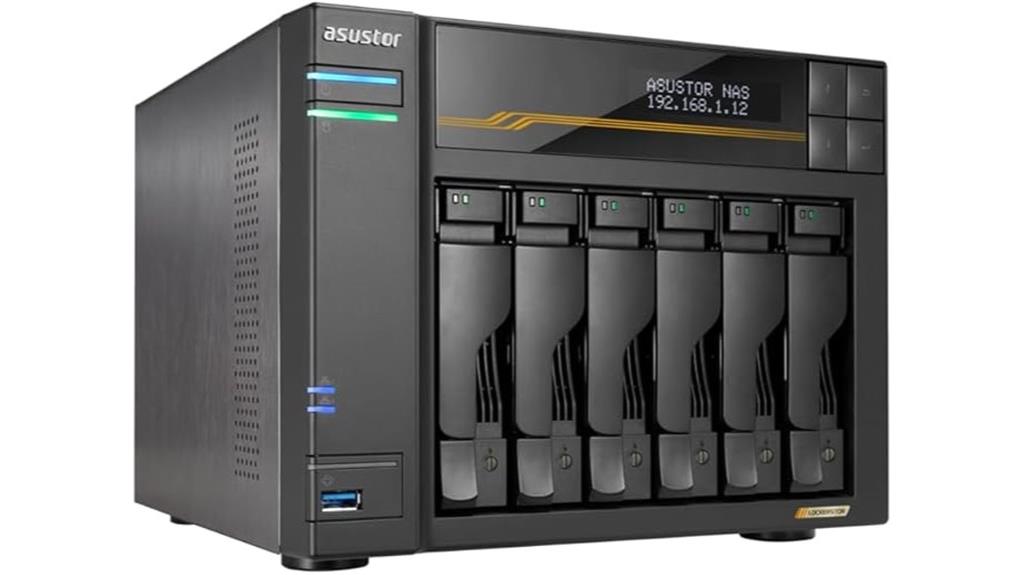
The Asustor Lockerstor 6 Gen3 NAS (AS6806T) stands out as an ideal choice for video and content creators who need high-performance storage solutions. Its quad-core AMD Ryzen embedded CPU, combined with support for DDR5 ECC RAM, guarantees excellent stability and data integrity. With four M.2 PCIe 4.0 NVMe SSD slots, it delivers doubled performance for demanding tasks. High-speed connectivity is a given, thanks to dual 10-Gigabit Ethernet ports and USB4 ports at 40 Gbps. Designed for flexibility, it supports customizable storage configurations and seamless external device integration, making it perfect for professional workflows and large-scale data management.
Best For: video and content creators seeking a high-performance, flexible storage solution with advanced connectivity and data integrity features.
Pros:
- Supports DDR5 ECC RAM for enhanced stability and data integrity
- Four PCIe 4.0 M.2 NVMe SSD slots for doubled performance
- Dual 10-Gigabit Ethernet ports and USB4 at 40 Gbps for ultra-fast connectivity
Cons:
- May be overkill for casual or home users with less demanding needs
- Larger physical footprint could require more space in setup
- Potentially higher cost due to advanced features and high-end components
Smart Personal Cloud Storage Device with 512GB SSD
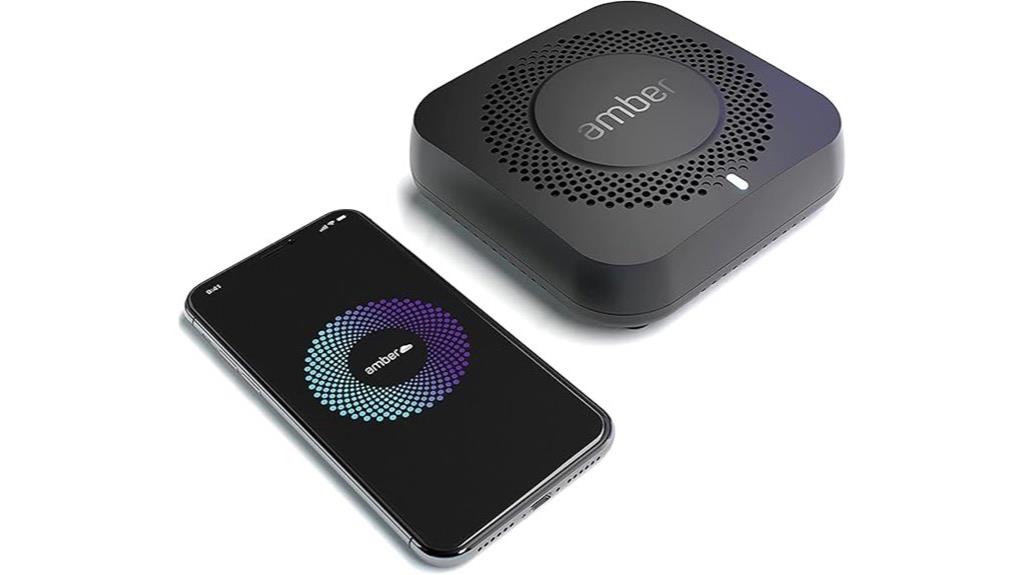
If you’re seeking a compact, secure personal cloud solution that supports multiple platforms, the Amber X Smart Personal Cloud Storage device is an excellent choice. It features a built-in 512GB SSD and USB expansion options, compatible with iOS, Android, Windows, and Mac. Despite its small size, it offers private, secure data ownership, making it a strong alternative to traditional cloud services. The device supports Plex and Home Assistant, perfect for home automation and media streaming. While setup can be complex and backup options somewhat limited, its hardware power and flexibility make it suitable for moderate storage needs and easy home-based data management.
Best For: users seeking a compact, secure, and versatile personal cloud device with moderate storage needs and multi-platform support.
Pros:
- Compatible with iOS, Android, Windows, and Mac, supporting diverse device ecosystems
- Supports Plex and Home Assistant for media streaming and home automation
- Offers private and secure data ownership with encryption options
Cons:
- Setup can be complex, especially for non-technical users, with multiple admin pages and network issues
- Limited internal storage at 512GB, requiring external drives for larger data needs
- Backup features have restrictions, such as folder name reuse and difficulty backing up subfolders selectively
QNAP TR-004 4 Bay USB-C DAS with Hardware RAID
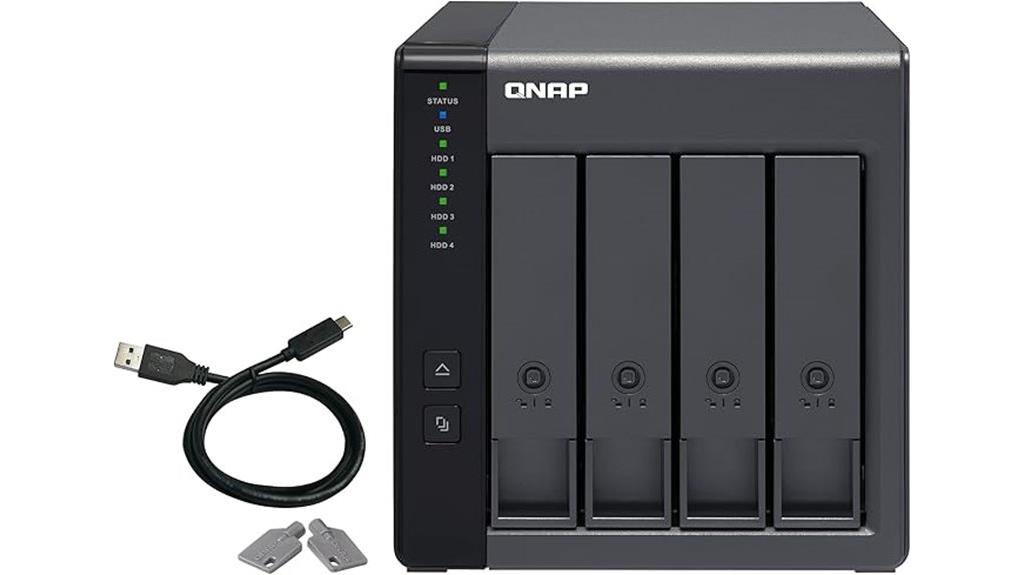
The QNAP TR-004 4 Bay USB-C DAS with Hardware RAID stands out as an ideal solution for professionals and small businesses seeking reliable external storage with flexible RAID options. It supports four 3.5-inch SATA drives and offers hardware RAID modes like RAID 0, 1, 5, JBOD, and individual disks, ensuring data protection and performance. With USB Type-C connectivity, it’s compatible with Windows, macOS, and Linux systems, making setup straightforward. The lockable drive bays add security, while its standalone design means it functions as external storage or for NAS backup, though it doesn’t integrate into NAS pools or run NAS apps.
Best For: small businesses and professionals seeking reliable external storage with flexible hardware RAID options compatible across multiple operating systems.
Pros:
- Supports hardware RAID modes (RAID 0, 1, 5, JBOD, and individual disks) for data protection and performance.
- Compatible with Windows, macOS, and Linux, ensuring versatile connectivity and straightforward setup.
- Lockable drive bays enhance physical security of stored data.
Cons:
- Cannot be integrated into NAS storage pools or run NAS-specific applications.
- Does not support certain NAS models or devices that cannot be updated to QTS 4.3.6 or later.
- Drives migrated between TR-004 units are not recognized if moved to other devices, limiting flexibility in drive management.
Factors to Consider When Choosing Network Attached Storage Devices
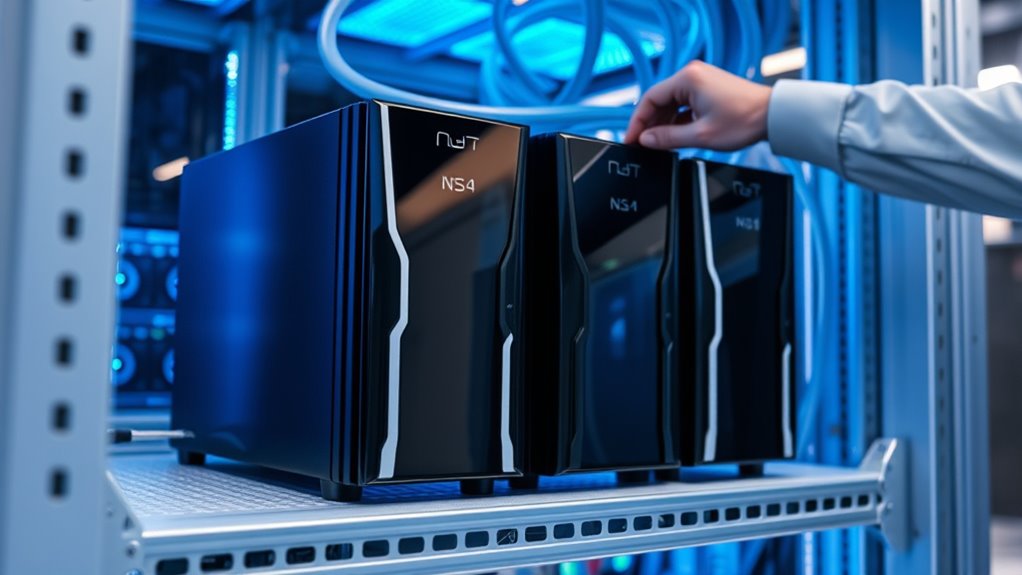
When selecting a NAS device, I focus on key factors like storage capacity options, performance specs, and connectivity choices to meet my needs. I also consider software features that enhance usability and security measures that safeguard my data. Understanding these points helps guarantee I choose a device that’s reliable and future-proof.
Storage Capacity Options
Choosing the right storage capacity for a NAS device depends on understanding the available options and how they suit your needs. NAS devices range from compact single-bay models with about 2TB to large multi-bay systems supporting over 100TB, fitting various user requirements. Many models support multiple drive configurations like RAID 0, 1, 5, 6, 10, and JBOD, allowing flexible balancing of capacity, redundancy, and performance. Diskless NAS units give you the freedom to add compatible drives, customizing storage size based on drive capacity and number. Some models support hot-swappable drives, making it easy to expand or replace drives without system shutdowns, boosting total capacity over time. Ultimately, your choice depends on the number of drive bays, supported drive sizes, and hardware limitations.
Performance Specifications
Ever wondered what makes a NAS device perform smoothly under heavy workloads? It all comes down to performance specifications. A fast processor, like a quad-core or higher, handles multiple applications and media transcoding efficiently. RAM capacity is equally essential; more RAM means better caching and the ability to support many users without slowing down. Network interface speeds also play a critical role—ports like 2.5GbE, 5GbE, or 10GbE dramatically boost data transfer rates compared to standard 1GbE connections. Additionally, support for SSDs, NVMe cache drives, and advanced cooling solutions can markedly enhance overall responsiveness, stability, and durability during intensive tasks. When selecting a NAS, these specs guarantee your system can keep up with demanding workloads and deliver seamless performance.
Connectivity Versatility
Connectivity versatility is a key factor in selecting a NAS device, as it determines how easily the system integrates into your existing network and peripherals. I look for models with multiple Ethernet ports, including options like 2.5GbE, 5GbE, or even 10GbE, to guarantee faster data transfer and future-proofing. USB support is also vital; USB 3.0, 3.2, and USB-C ports allow me to connect external drives, printers, or other peripherals effortlessly. Some NAS units even offer HDMI outputs, enabling direct media playback on monitors or TVs without extra equipment. Compatibility with various network protocols such as SMB, AFP, NFS, and iSCSI guarantees seamless file sharing across different operating systems. Additional connection options like eSATA or Thunderbolt can further enhance speed and redundancy, making versatility indispensable for my workflow.
Software Features
Have you considered how the software features of a NAS can elevate your data management experience? A user-friendly interface makes steering through your storage simple, while remote access lets you manage files from anywhere. Compatibility with multiple operating systems like Windows, macOS, Android, and iOS guarantees seamless integration across devices. Many NAS devices offer app ecosystems, allowing you to add tools such as media servers, backup solutions, or Docker containers for extra functionality. Built-in AI applications, like photo recognition and duplicate removal, help optimize multimedia storage. Security features—encryption, two-factor authentication, and user permissions—protect your data’s privacy. Plus, support for various backup protocols and cloud integration enhances data sharing, synchronization, and off-site backups, making your storage both versatile and secure.
Security Measures
When selecting a NAS device, prioritizing security measures is key to protecting your data. Implementing strong user authentication, like multi-factor authentication, guarantees only authorized users gain access. Data encryption methods such as AES-256 safeguard files both at rest and during transmission, making data interception useless to hackers. Regular firmware and software updates are critical—they patch known vulnerabilities and bolster defenses against cyber threats. Configuring network security features like firewalls, IP filtering, and VPN support further reduces unauthorized access risks. Additionally, enabling automatic backups and snapshots helps maintain data integrity and allows quick recovery after security incidents. By focusing on these security measures, you can considerably reduce vulnerabilities and ensure your data remains protected in today’s evolving digital landscape.
Compatibility Range
Choosing a NAS device requires careful consideration of its compatibility range to guarantee it works seamlessly with your existing setup. I look for support across multiple operating systems like Windows, macOS, Linux, Android, and iOS to ensure easy access from any device. External drive support via USB or eSATA is essential for expanding storage or backups with third-party drives from Western Digital, Seagate, or Toshiba. Compatibility with network protocols such as SMB, AFP, NFS, and iSCSI helps ensure interoperability in diverse network environments. I also check whether the NAS can integrate with cloud services, remote access, and virtualization platforms, broadening its functionality. A wide compatibility range guarantees flexibility, future-proofing, and smoother data management across all my devices and services.
Power Efficiency
Ensuring your NAS device is power-efficient can substantially reduce energy costs and environmental impact over time. I look for models with low idle and active power consumption, typically between 9-10W when idle and around 51W at full load. Many energy-efficient NAS units feature advanced thermal management and fan control, helping minimize power use while keeping temperatures ideal. Switching to SSDs instead of HDDs can notably cut power consumption, as SSDs draw less energy during operation. Additionally, built-in power-saving features like scheduled shutdowns, sleep modes, and automatic standby modes help eliminate unnecessary energy use. Choosing a NAS with ENERGY STAR certification is a smart move, as it indicates high standards for power efficiency and a smaller environmental footprint.
Cost Effectiveness
Evaluating cost effectiveness means looking beyond the initial purchase price to understand the long-term financial impact of a NAS device. I consider the total cost of ownership, including potential upgrade expenses and ongoing maintenance fees. Features like cache drives or RAM upgrades can boost performance without additional hardware costs, which is a smart way to save. I also compare the price-to-storage capacity ratio to ensure I’m getting the best value for my budget. Energy efficiency matters too—lower power consumption reduces operational costs over time. Finally, I weigh the long-term savings from investing in a durable, reliable NAS, as it minimizes costs related to repairs, replacements, or data loss. This extensive approach helps me choose a device that balances upfront costs with ongoing savings.
Frequently Asked Questions
How Secure Are NAS Devices Against Cyber Threats and Data Breaches?
NAS devices can be quite secure if you take proper precautions. I make sure to enable strong passwords, keep firmware updated, and use encryption to protect my data. Regular backups and network segmentation also help prevent breaches. While no device is completely invulnerable, these steps considerably reduce risks. I stay vigilant and monitor access logs to catch any suspicious activity early, ensuring my data stays safe.
Can NAS Devices Be Integrated With Existing Cloud Storage Solutions?
Yes, NAS devices can be integrated seamlessly with existing cloud storage solutions. I often connect my NAS to cloud services like Dropbox, Google Drive, or OneDrive, creating a hybrid environment. This setup allows me to sync files, back up data, and access information from anywhere. By combining local storage with the cloud, I guarantee data redundancy, enhance accessibility, and streamline my data management process effortlessly.
What Are the Energy Consumption Differences Among Various NAS Models?
Energy consumption varies among NAS models, and I’ve noticed that more advanced, feature-rich devices tend to use more power. For example, high-performance models with multiple drives and powerful processors consume more energy during operation, especially under heavy loads. On the other hand, energy-efficient models focus on low power usage, often including power-saving features. When choosing a NAS, I recommend considering your usage needs and energy preferences to find the best balance.
How Easy Is It to Expand Storage Capacity Over Time?
Expanding storage on a NAS is like adding building blocks to a tower—easy and scalable. Most models I’ve used feature hot-swappable drives or expanders, making upgrades straightforward without downtime. For instance, last year I grew my NAS from 4TB to 16TB in minutes, thanks to modular design. As technology advances, I’ve found that choosing a NAS with flexible expansion options guarantees your data storage keeps pace with your needs.
Are There Compatibility Issues With Different Operating Systems?
No, most NAS devices are designed to be compatible with various operating systems like Windows, macOS, and Linux. I’ve found that manufacturers typically include multiple protocols, such as SMB, AFP, and NFS, to guarantee smooth integration. Sometimes, I need to tweak settings or install specific apps, but overall, compatibility issues are rare. It’s always a good idea to check the device’s specifications to confirm it supports your OS.
Conclusion
Choosing the right NAS device really depends on your needs, but did you know that the global NAS market is expected to grow at a CAGR of 12.3% through 2025? That’s a clear sign of how essential seamless data management has become. Whether you’re a home user or a small business, investing in a reliable NAS device like those listed guarantees your data stays secure, accessible, and well-organized—making your digital life much easier.
